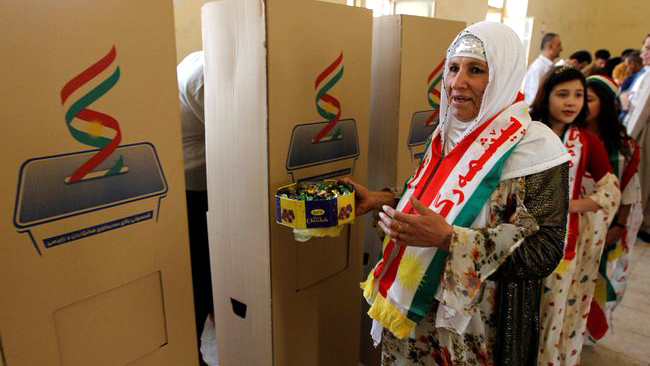Kurdistan: a step towards independence?
Expert: “The Kurds are aware of having a historic chance”
An independence referendum was held in Iraqi Kurdistan on Monday, September 25. The turnout was high: Reuters reports that 78 percent of voters came to the polling stations. The authorities are saying it will take at least three days to count the votes, but the media believe that the vast majority of the population has opted for secession.
Incidentally, Iraqi Kurdistan has already been vested with broad autonomy. Besides, it is the world’s sixth largest source of oil. This is why both the Kurds and the central government are striving to control this region.
The referendum’s results are not binding and will not thus mean the immediate independence of the region. Deutsche Welle claims they will give the regional government more bargaining power in negotiations with Baghdad.
“Independence will allow us not to repeat past tragedies. The partnership with Baghdad has failed, and we will not return to it,” the region’s President Masoud Barzani said. The leader had told the Voice of America earlier that, following the referendum, the Kurdish government would begin discussions with Baghdad on such issues as border demarcation, division of natural resources, and a timeline for declaring independence. Barzani estimated the transition time would be one to two years.
The entire region closely watched the Iraqi Kurdistan referendum, for, according to the BBC, “the consequences of the vote could reshape the Middle East.” Incidentally, the Kurds are some of the most numerous peoples in the world, which still have no autonomy: 35 million Kurds live in Turkey, Iraq, Iran, and Syria. This raises concern in these countries about the striving of their own Kurdish minorities for independence.
Turkish President Recep Erdogan has called the vote “unacceptable” and threatened to shut off the pipeline that transports oil from Iraqi Kurdistan to other countries. Iran has banned all flights to and from the region. UN Secretary General Antonio Guterres has expressed concern over the referendum’s “potentially destabilizing effects.” Meanwhile, White House spokesperson Sarah Sanders said the independence referendum could set off ethnic conflict and undermine the US-led coalition against the Islamic State.
The Day requested Ihor SEMYVOLOS, Executive Director of the Center for Middle Eastern Studies, to explain why the Iraqi Kurds are striving for independence and to forecast the scenario of developments in the Middle East.
“THE BATTLE FOR KIRKUK MAY BECOME THE PROLOGUE TO A NEW WAR”
“Since 2003, when the US launched a military operation against Saddam Hussein, Iraqi Kurdistan has been in fact functioning as a separate entity. Naturally, it has developed an infrastructure of its own in the past few decades. The impression is that they have long been functioning as a separate state.
“Kurdistan believes today that it has received a historic chance because the Kurds have gained a serious military and political clout in the region. This is linked to the Islamic State, the decline and fall of traditional institutions, and ruination of the idea of borders. Essentially, we can see this in Syria, where the country is divided by various pressure groups, and where neighbors are actively interfering into that country’s internal affairs.
“On the whole, the Kurds feel today that they have got a historic chance and they must use it to have, at last, an independent Kurdish state.
“The Kurds’ aspiration for independence is quite an old story. We can recall the decline of the Ottoman Empire, where the Kurdish question was one of the key issues in terms of succession. US President Woodrow Wilson once insisted that the Kurds be granted independence. But it did not occur at the time, so the Kurds are trying to realize this aspiration today.
“I doubt that the central Iraqi government can really conduct a military operation today against the Kurds on the territory of the previously recognized autonomy. But this does not perhaps apply to the city of Kirkuk, one of the key oil-producing areas in northern Iraq. It is around this city, in fact controlled by the Kurds, that the main battle will be raging. And the battle for Kirkuk may become the prologue to a new war, this time between Arabs and Kurds.
“So, there is a real danger. Turkey, official Damascus, official Baghdad, and the key players in the Middle East and the rest of the world categorically oppose the opening of a new front. They know very well that it is very dangerous to open a new front before the crucial problem of the Islamic State is resolved.
“I will add that the Kurds are very well aware of this, and they are hurrying as long as their services are still needed. Peshmerga and all the other Kurdish military units that control a much larger territory than the areas populated by Kurds are a weighty argument in favor of the fact that the Kurds will be reckoned with.
“As for the fact that only Israel has expressed support for Kurdistan, it has always been siding with any non-Arab peoples. It is Israel’s traditional policy. As the Kurdish question complicates the life of both the Turks and the Arabs, it is obvious that Israel is adhering in this case to the principle ‘my enemy’s enemy is my friend.’
“I can see no direct impact of the situation around Iraqi Kurdistan on Ukraine. Of course, we have a small but rather vociferous Kurdish community here. So, in case of a more serious aggravation of the situation, such as the beginning of military actions, we may see this group protest or express its support. But, on the whole, there will be no more or less serious impact on Ukraine. The partial impact will only lie in the fact that Ukraine conducted quite a good trade with Iraqi Kurdistan because it was the most stable and dynamically developing region and Ukraine has its interests there.”
Newspaper output №:
№57, (2017)Section
Day After Day





